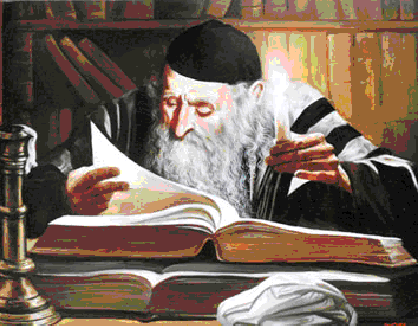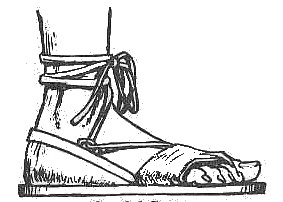CHAPTER VII.
7:1 There are seven things that characterize a boor, and seven that characterize a wise man. A wise man does not speak before one who is greater than him in wisdom or age. He does not interrupt his fellow's words. He does not hasten to answer. His questions are on the subject and his answers to the point. He responds to first things first and to latter things later. Concerning what he did not hear, he says "I did not hear." He concedes to the truth. With the boor, the reverse of all these is the case.
7:2: A scholar must be careful in his eating, drinking, washing, anointing, in wearing the sandals, in his walking, dressing, in the use of his voice, in the act of spitting, and also with all his good deeds.
When we read verse 7:1 we see it is an exact quotation for Pirkei Avot 5:7. This helps us in dating the two Tractates of Derek Eretz. (see Prologue) Rabba Ben Bagbag, who is quoted in a verse after Pirkei's 5:7, is an early Tanna, a rabbi from the Mishniac age of 10 to 220 CE. Assuming Derek is quoting Pirkei and not the other way around, we can see that Derek was written it the late Tanna period or a bit after.
Again, the Rabbis want us to learn manners and proper relations with others. They distinguish between learned individuals and those who appear without learning. The list given in 7:1 is self explanatory, albeit not followed much today, if watching TV's entertainment news, with 4 talking heads screaming at each other, is any indication.
7:2 is a list of things learned men are to try to do. Most all also self explanatory. Let me touch on ''anointing'', ''in wearing the sandals,'' and ''spitting.''
Anointing is referring to the use of oil and fragrant perfumes. The Talmud speaks of the use of these items, and one of the 39 melachot, forbidden work on Shabbat, involves not perfuming one's clothing. One can also not anoint one's skin or hair on fast days, e.g. Yom Kippur. The verse also refers to not overdoing it with anointing one's self in oil. This is reserved for kings, and we need to keep ourselves humble.
On Shabbat, it is considered non-allowed work to clean one's shoes. Hence one must take care that his shoes are clean before Shabbat. Since verse 7:2 is concerned about proper dress, the sages are also concerned that one's sandals be presentable at all times.
Spitting should be done into one's handkerchief, or away from others. For those of us who have been passengers on the subways in the 1950s and 1960s, we can remember folks spitting at their feet, (and ours). We can remember the "Do Not Spit" in the subway signs. The sages want us to have proper behaviors in public and certainly not do anything that could cause offense.
Shabbat Shalom:
Rabbi Arthur Segal_
www.jewishspiritualrenewal.org_ (http://www.jewishspiritualrenewal.org/ )
Jewish Renewal_
www.jewishrenewal.info(http://www.jewishrenewal.info/ )
Jewish Spiritual Renewal
Jewish Spirituality
Eco Judaism
Hilton Head Island, SC, Bluffton, SC, Savannah, GA
If visiting SC's Low Country, contact us for a Shabbat meal, in our home by the sea, our beth yam.
Maker of Shalom (Oseh Shalom) help make us deserving of Shalom beyond all human comprehension!!




